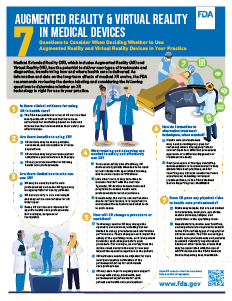Augmented Reality and Virtual Reality Medical Devices: Questions to Consider
If you’re a patient, caregiver, or health care professional considering using Augmented Reality (AR) or Virtual Reality (VR) in your health care or practice, the U.S. Food and Drug Administration (FDA) developed these infographics to help you weigh some of the benefits and risks and make an informed decision before using AR or VR medical devices.
Medical extended reality (XR), which includes AR and VR, has the potential to improve your health care, delivering new types of treatments and tools for diagnosis and treatment of health conditions. Treatments may range from neurology to orthopedics to radiology and more. Medical XR may help provide care at home, outside of the hospital or when a specialist is not locally available. As information on the benefits and risks, including the long-term effects, of medical XR are continuing to be studied, the FDA recommends the following questions for you to consider when deciding whether to use XR technology:
For Patients
Download the Poster (Web and PDF):
Digital Version (1.9 MB)
8.5" x 11" (2.25 MB)
11" x 17" (2.41 MB)
For Health Care Professionals
Download the Poster (Digital and PDF):
Digital Version (1.87 MB)
8.5" x 11" (958 KB)
11" x 17" (869 KB)
FDA Resources About XR
| Resources | Description |
|---|---|
| List of Medical Devices that Incorporate XR (including AR/VR) | This is a list of medical devices that incorporate AR/VR marketed in the United States. |
| Medical Device Reporting (MDR): How to Report Medical Device Problems | The FDA encourages patients and health care professionals to report any adverse events that were experienced while using the AR/VR device to the FDA’s Medical Device Reporting tool, MedWatch. |
| FDA’s Manufacturer and User Facility Device Experience (MAUDE) | The MAUDE database houses MDRs submitted to the FDA by mandatory reporters such as manufacturers, importers and device user facilities and voluntary reporters such as health care professionals, patients and consumers. |
| Medical Extended Reality Program: Research on Medical Extended Reality-Based Medical Devices | The Medical Extended Reality Program conducts regulatory science research to help ensure patient access to innovative extended reality-based devices that are safe and effective. |
| Artificial Intelligence and Machine Learning Program: Research on AI/ML-Based Medical Devices | The Artificial Intelligence and Machine Learning (AI/ML) Program in the FDA’s Center for Devices and Radiological Health (CDRH) conducts regulatory science research to ensure patient access to safe and effective medical devices using AI/ML. |



